Main story: PitStop Outreach ensures homeless get food, resources
Gilroy nonprofit works with Martha’s Kitchen to serve up to 90 meals a day
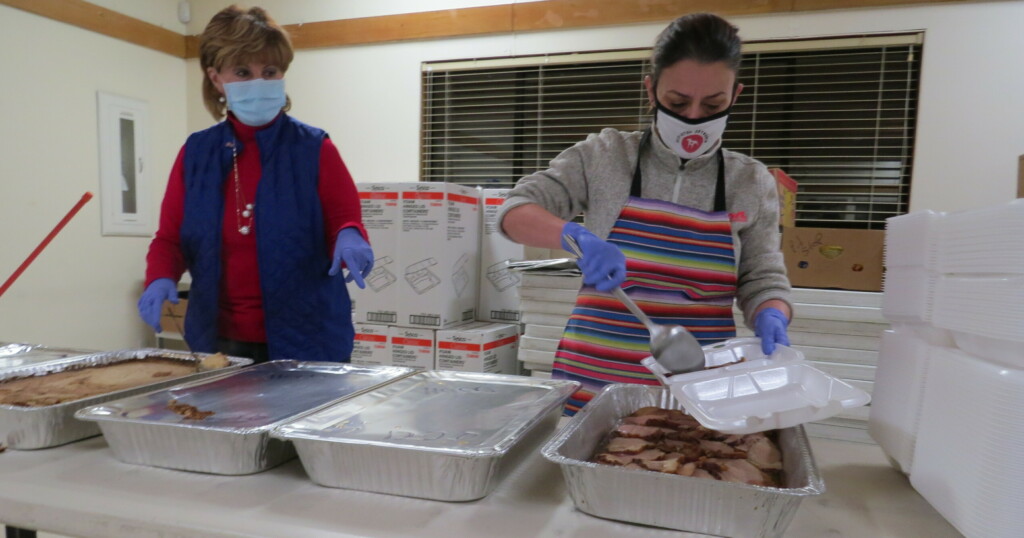
Photo by Marty Cheek PitStop Outreach volunteers Mary Ann Rodriquez and Toni Bowles package food before the nonprofit serves the meals to those in need in Gilroy Dec. 23.
By Marty Cheek
Sam Brown is a former homeless man who goes by the nickname of “Pit.” He went through the camping program at Gilroy’s Compassion Center and found some work there. The experienced inspired him with the idea of giving back as a champion of the unhoused — and encouraging others to do the same. That’s how PitStop Outreach was formed a year ago.
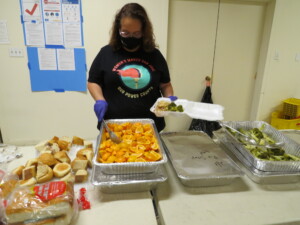
PitStop Outreach volunteer Gilroy City Councilmember Rebeca Armendariz packages meals.
Photo by Marty Cheek
The Gilroy-based nonprofit organization provides meals and other necessary items to help the many homeless men, women and children in the South Valley region. It is a matter of making sure they can survive with human dignity, especially as COVID-19 impacts the economy and more people find themselves without shelter.
“There weren’t many resources because of the pandemic, but we’ve opened up so many doors for the homeless,” Brown said. “We just keep on trying to feed them, clothe them, give them a chance by giving them what they need.”
The 47-year-old man is inspired by his mother, who died about a year ago. She took time to help those in need and encouraged him to do the same in a spirit of compassion.
“Hopefully, she’s looking down on me,” he said. “They’re not just people. They’re family.”
On a cold night two days before Christmas Day, three volunteers were in the Veterans Memorial Hall kitchen packing the food into the Styrofoam containers — cooked beef, mashed potatoes, broccoli, and a cupcake. They were Toni Bowles, owner of the Neon Exchange business in downtown Gilroy, her mother, Mary Ann Rodriquez, and Gilroy City Councilmember Rebeca Armendariz.
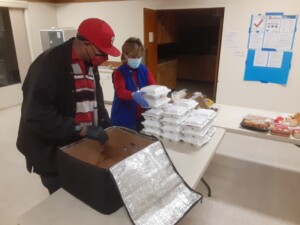
Sam Brown and Mary Ann Rodriguez load packaged meals for transportation.
Photo by Marty Cheek
Bowles described the early days of PitStop, how when the COVID-19 shelter-in-place orders hit in mid-March, the paperwork for the nonprofit status had just been completed. Most food pantries were shut down for public safety reasons. At first, the meals were cooked in the kitchen at the Neon Exchange, but that site proved impractical because they needed a commercial kitchen. They contacted the executive directors of Gilroy’s Veterans Memorial Hall building and sought permission to use their kitchen, which was happily granted.
“PitStop grew quite quickly just out of sheer need,” she said of how they came to work with the South Santa Clara Valley Memorial District that operates the hall. “It’s a clean environment and controlled environment”
The volunteering opportunity is kid friendly and fourth and sixth graders have helped prepare the meals.
Bowles was shocked to see the encampments and the conditions people are living there.
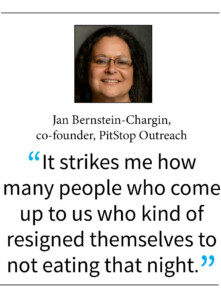 “It was moving because so many people set up shop in so many different ways, whether it was under the bridge, you can see that they makeshift shelters,” she said. “Some made walls under the bridge. Some lived in tents and some in trailers. All of them were really grateful for the meals.”
“It was moving because so many people set up shop in so many different ways, whether it was under the bridge, you can see that they makeshift shelters,” she said. “Some made walls under the bridge. Some lived in tents and some in trailers. All of them were really grateful for the meals.”
She described the importance of building an “innate trust” with the homeless people in these sites, describing how Sam Brown’s reputation as a former homeless man helped them know he understood their plight. Arriving at the encampments, he would honk his horn or whistle to let them know the food had arrived, and they would come for their meals.
“There is a lot of respect out there for Sam,” Bowles said. “With him, it’s just, ‘I’m here, I’m one of them.’”
The COVID-19 crisis has added to the burden of many people living without shelter because county public safety orders closed down the hot meal sites such as local churches, said Jan Bernstein-Chargin, a Gavilan information officer. She helped start the Compassion Center and is now on the board of PitStop Outreach, which she co-founded with Brown.
“Some of us were batting around the idea that we need to do outreach in Gilroy — and then the pandemic hit,” she said. ”The Compassion Center’s indoor services were shut down, and no longer could you go into the Lord’s Table (food pantry) to get dinner, no longer could you go into the Compassion Center. They switched to a grab-and-go model.”
 As a growing number of homeless people faced food insecurity starting in mid-March, PitStop partnered with Martha’s Kitchen.
As a growing number of homeless people faced food insecurity starting in mid-March, PitStop partnered with Martha’s Kitchen.
A cook who works at that San Jose-based nonprofit and is a Gilroy resident drives 80 to 90 hot meals down Monday through Friday. PitStop volunteers spend time packing them into single-serve Styrofoam containers. These are placed in large, insulated tote bags and volunteers bring these meals into the encampments along local creeks and the highway or serve them to people on the street.
“It strikes me how many people who come up to us who kind of resigned themselves to not eating that night,” Bernstein-Chargin said. “Think about it. If a stranger drives up to you and yells out the window, ‘Are you hungry, would you like dinner?’ People are saying, ‘Yeah.’ There are a lot of people who are hungry out there.”
Finding shelter during the shelter-in-place order is another challenge for the homeless that PitStop organizers are trying to find solutions for. Sometimes four people might live together in one tent, potentially infecting each other with COVID-19 virus. PitStop held a Facebook fundraiser to fund the purchase of private one-person tents for people in encampments.
Sanitary needs also pose a struggle for the homeless during the pandemic. It’s difficult to wash hands 20 or more times a day without a sink. PitStop built hand-washing stations and brought them to the encampments. The group also distributes masks to help minimize the spread of the virus. They provide ponchos and jackets, as well, to keep homeless people warm during the winter.
People living in the homeless encampment often join together in teams to clean up the site and minimize the accumulation of trash. South Valley waste management company Recology brings large trash containers to these sites so that the debris can be properly disposed of and prevent contamination of the local environment. PitStop also provides fire extinguishers for some encampments over the summer when weeds and grass grows dry, a danger to safety of those dwelling in these areas. Fire extinguishers are also provided to families living in RVs.
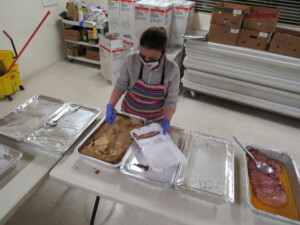 Another problem is the safe disposal of human waste. PitStop is providing the homeless with specially made portable $10 toilet seats that fit over five-gallon buckets that can be used for human waste needs. This is vital to combating a public health risk as the waste might go into the creek and spread downstream. A chemical treatment called EcoGreen helps minimize unpleasant odors.
Another problem is the safe disposal of human waste. PitStop is providing the homeless with specially made portable $10 toilet seats that fit over five-gallon buckets that can be used for human waste needs. This is vital to combating a public health risk as the waste might go into the creek and spread downstream. A chemical treatment called EcoGreen helps minimize unpleasant odors.
“This is not a glamorous problem but let’s start working on it,” Bernstein-Chargin said. “We’re trying some things in Gilroy that maybe could be a model for other communities, too.”
The number of people who are homeless in Santa Clara County is expected to grow considerably in 2021 because of COVID-19. The economic downturn is resulting in thousands of people losing their jobs or businesses and thus being evicted from their homes because they cannot pay the rent or mortgage.
The pandemic has crippled businesses of all sizes and left millions out of work, meaning homelessness in the United States is on the rise.
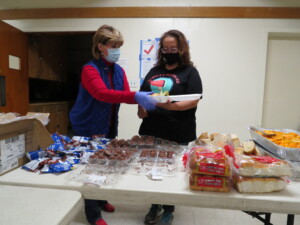 America is facing the most severe housing crisis in its history, according to the Aspin Institute, which in August released an analysis report estimating 30 to 40 million people in the United States could be at risk of eviction in the next several months.
America is facing the most severe housing crisis in its history, according to the Aspin Institute, which in August released an analysis report estimating 30 to 40 million people in the United States could be at risk of eviction in the next several months.
Bernstein-Chargin encourages local people who wish to help PitStop Outreach to visit its website and donate money. The organization has no paid staff. Volunteers will use the money to buy supplies and for gasoline to make deliveries.
Those homeless people helped during this time of need gain a psychological boost knowing that others care about their condition, she said.
“I’ve encountered a lot of gratitude. People are very thankful that we’re bringing the meals out,” she said. “They appreciate the blankets and the tents. It’s hard. It’s cold out there at night.”

